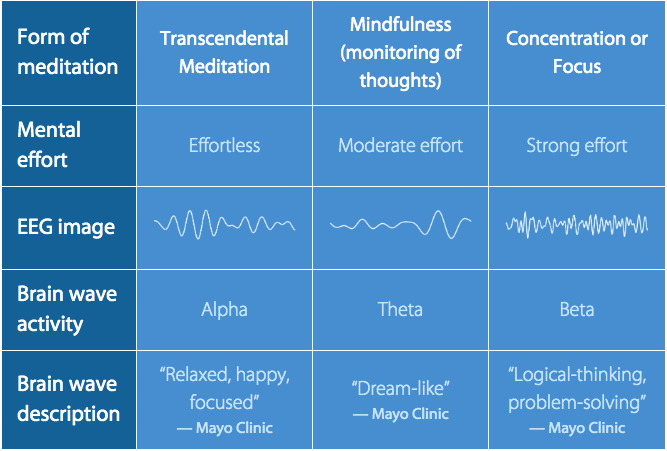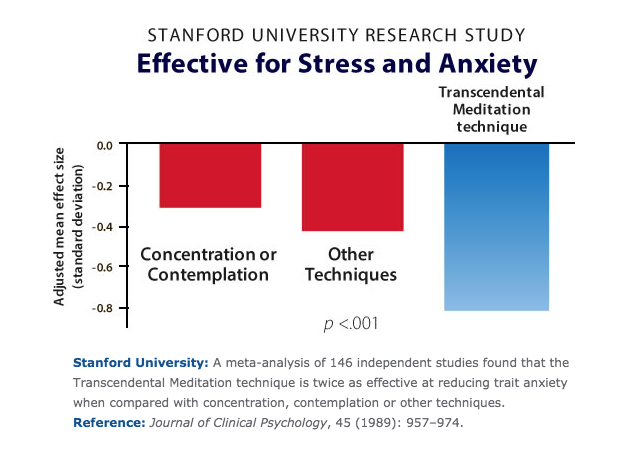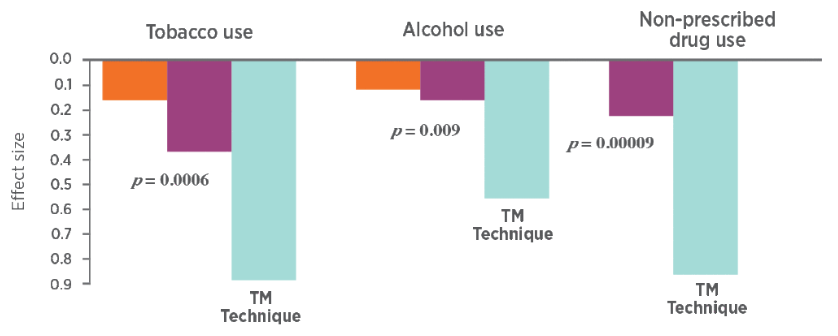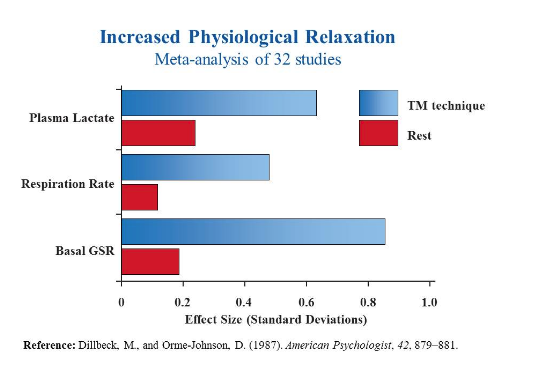What's the difference between Transcendental Meditation & the Other Types?
In this article, we’re going to discuss the differences between Transcendental Meditation, and the other meditation techniques.
The main categories of meditation include:
- Automatic self-transcending (AST)
Includes techniques that go beyond the steps of the meditation technique itself (includes Transcendental Meditation) - Focused attention or concentration techniques
Requires sustained and controlled attention to the present moment or object of attention (includes Vipassana meditation) - Open monitoring of what is
All experiences are allowed to pass through awareness without manipulation, control, or judgment (includes mindfulness meditation)
We are going to be covering the differences between each of these types of meditations, comparing their effects on the brain, and resolving misunderstandings around frequently asked questions on the topic.
Let’s go!
What is the difference between Mindful Meditation and Transcendental Meditation?
Mindful Meditation and Transcendental Meditation are two different meditation techniques.
When practicing Mindfulness Meditation, all experiences are allowed to pass through awareness without judgment. Attention is focused on the present moment.
This technique trains the practitioner’s mind to be in a state of non-judgment and alertness towards what is.
Transcendental Meditation, on the other hand, focuses the attention on a mantra (single syllables word without any particular meaning) as a vehicle for transcending the process of thought altogether.
It trains the practitioner to go beyond the steps of the meditation technique to obtain a state of pure consciousness, silence, bliss.
Mindfulness vs Transcendental Meditation
Mindfulness and Transcendental Meditation are not the same…
Mindfulness is a quality of the mind and Transcendental Meditation, as we discussed before, is a meditation technique.
The quality of mindfulness can and is usually developed, through the Transcendental Meditation technique.
John Kabat-Zinn, one of the most popular writers in the west around the topic, describes mindfulness as:
“the awareness that arises through paying attention, on purpose, to the present moment, non-judgmentally.”
Here a great article about Ashtanga yoga and mindfulness 👉 How does Ashtanga yoga cultivate mindfulness?

Zen Meditation vs Transcendental Meditation
A note before we start talking about Zen: there is the real world, and there’s also a whole system of symbols about that world, that we have in our minds…
These are very very useful symbols, all civilization depends on them, but they are usually confused with reality (gong sound).
Meditation is the discovery, that the point of life, is always arrived at in the immediate moment.
Zen meditation is a focused attention technique, where the practitioner focuses his or her attention on the present moment, becoming fully aware of what’s going on.
It’s a kind of digging in the present, a kind of grooving with the Eternal now.
The difference between that technique and the Transcendental Meditation technique is that the latter is aimed at transcending the thought process resulting in a state of pure consciousness, whereas Zen Meditation, is focused on training the mind to dwell in the now.
It’s funny that one meditates for no reason at all, or else he or she is not meditating…
If consciousness is an Ocean, Zen meditation it’s all about surfing the waves and playing on the surface of the water and Transcendental Meditation is about letting oneself go into the deepest parts of the ocean.
When practicing both of those techniques we are the ocean, we are just playing different games.
Is Transcendental Meditation the best type of meditation?
Transcendental Meditation is the best meditation technique for transcending the thought process of the mind and reaching a state of pure consciousness.
That said, all meditation techniques have different benefits and characteristics.
For instance, focused attention and open monitoring practices stimulate the frontal cortex of the brain because they use the surface level of the mind, training it to obtain specific outcomes.
Automatic self-transcending (AST) techniques use a Mantra as a vehicle to let the mind settle and ultimately transcend thought.
The effects on the brain of every meditation technique

- The Alpha Brain Wave activity present on the Transcendental Meditation column is associated with relaxation of the body.
- On the other hand, the Theta brainwave present on the mindfulness column is associated with readiness to process incoming signals.
- Lastly, the Beta brain waves present on the concentration or focus column, refer to a state of alertness and engagement in problem-solving. These types of brain waves dominate our normal waking state of consciousness.
Transcendental Meditation benefits
Transcendental Meditation has a plethora of benefits that have been proven by science.
Step-by-step the mind is led into the transcendental field, and this is everything that you get from it…
1. Enhances your sense of inner peace
Practicing Transcendental Meditation regularly calms the mind and relieves the nervous system from any tension, allowing inner peace to grow easily.
The natural tendency of the mind is to go towards a place of greater happiness allowing for this inner peace to grow within.
2. Reduces anxiety
Studies show that Transcendental Meditation is effective in reducing trait anxiety.
Results of the experience not only showed a reduced level of trait anxiety from the participants within the first two weeks but also that those levels were maintained three years afterward.

3. Helps normalize blood pressure
Many organs of the body are harmed with long-standing high blood pressure.
Several studies show how effective TM can be in bringing blood pressure levels to normal ranges.
Reducing blood pressure to the normal range can improve our health in many ways, reducing the incidence of stroke, heart disease, and hardening of the arteries.
4. Reduces addictive behavior
The Transcendental Meditation technique has been proven to reduce the intake of alcohol, tobacco, and non-prescribed drugs, at a much higher rate than normal substance abuse treatments.
The positive effects of the use of the Transcendental Meditation technique to reduce addictive behavior has been proven to increase over time, whereas the effect of conventional programs typically falls off quickly.

5. Deep rest that rejuvenates the body
While practicing TM, the body experiences a unique and profound rest, greater than the one experienced during the deep sleep or dreaming states.
This deep rest is what also leads to a reduction in blood pressure and anxiety levels.

6. Improves your emotional development
It has been proven that Transcendental Meditation Improves emotional intelligence.
This is done through an increased perception of one’s own emotions and then being able to use that information to adapt to our environment.
7, Increases the sensation of happiness
As explained by Maharishi Mahesh Yogi, the mind gravitates towards the state of greater and greater happiness naturally.
The experience of the transcendental field is described as Bliss, and that Bliss naturally makes the mind trickle-down subtler and subtler levels of thought, to find that experience.
More and more happiness is experienced in the direction of transcendence.
8. The mind settles and becomes alert
This is also referred to as a state of restful alertness.
Scientific research shows that Transcendental Meditation practice lowers sympathetic nervous activity as a result of this restful alertness.
It’s a very different type of rest than the one we get from sleep. Several clinical studies show that this state is rejuvenating and healing in nature
9. Can result in an experience of Cosmic Consciousness
Cosmic Consciousness also referred to as the field of infinite intelligence can be experienced through the practice of Transcendental Meditation.
Transcendental Consciousness is one layer of reality at the basis of all life, so, in this way, Transcendental Meditation is a direct procedure to communicate with the cosmic intelligence and to experience it firsthand.
Does Transcendental Meditation have any side effects?
There are plenty of scientific papers written about the benefits of practicing Transcendental Meditation.
This article by the David Lynch Foundation highlights a lot of different research papers that evidence the health, physical, and physiological benefits that the practice of Transcendental Meditation can bring.
And this is a very interesting video where Dr. John Hegelin goes about explaining all of the benefits that Transcendental Meditation can have from a scientific point of view.
The amount of scientific evidence supporting the benefits of Transcendental Meditation is too vast to quote it here.
However, just to wrap this section up…
Here you have over 400 Scientific research studies around the implications in health, mental potential, social behavior, and World Peace that Transcendental Meditation can have.
What mantra should I use for Transcendental Meditation?
The Transcendental Meditation mantras are vehicles where the mind settles and rests trickling into subtler and subtler levels of thought until the Mantra itself is fully transcended.
There are two qualities that the Mantra must-have for this process to occur:
- The Mantra must be meaningless
Having a word that has meaning for the practitioner will keep the mind on the surface level and prevent it from going into subtler levels of thought - And its vibration must have resonance
Mantras must have a resonance aspect sourced from the primordial hum (Om). This aspect charms and attracts the mind and leads it towards silence.
The mantras in Transcendental Meditation come from the Vedic traditions of India and are specifically for transcending thought.
A fully trained teacher will give you a mantra that is suitable to you after a brief questionnaire and based on a process taught by Maharishi to ensure it is correct.
It is very important to receive the Mantra from a fully-trained transcendental meditation teacher to ensure every person receives the proper instruction.

Is Transcendental Meditation worth the cost?
Taking into account the number of benefits that you get out of the practice of Transcendental Meditation, it is very hard to label: ‘not worth the cost’, anything that brings that kind of well-being and happiness.
The cost of the Transcendental Meditation course is definitely worth it for a practice that will benefit you for your entire life.
The path of Transcendental Meditation leads the mind towards reaching the state of Pure Consciousness or Bliss.
Here, in this newly discovered state of being, the Mind becomes soaked with Energy, intelligence, and great happiness.
With it, it comes out and performs and experiences the world much better than before.
What do you get by attending a TM training course?
The technique behind Transcendental Meditation is simple because it’s the natural state of the mind to go towards greater states of happiness as taught by Maharshi.
The trained teachers of Transcendental Meditation will give the student a suitable word (a mantra).
Then the man can experience the thought of that sound and start minimizing that thought, to experience the finer and finer states of that thought. Until the source of that thought is fathomed and the conscious mind reaches the transcendental area of being.
So, from a gross state of thought to the subtler and subtler states-of-though, the Transcendental Meditation technique leads the mind towards the state of pure consciousness.
Is Yoga Nidra considered Transcendental Meditation?
Yoga Nidra is not considered to be Transcendental Meditation.
Transcendental Meditation is a very specific meditation technique that effortlessly and step-by-step leads the mind into the transcendental field.
On the other hand, Yoga Nidra is a sleep-based meditation technique that uses the conscious mind to gently take your awareness to each part of the body.
Based on the categorization of meditation techniques we gave at the beginning, while Transcendental Meditation is considered to be an automatic self-transcending technique (AST), Yoga Nidra can be considered a focus attention technique.
Although the benefits of both of these techniques can be similar, it’s important to note that Yoga Nidra and Transcendental Meditation are two different meditation techniques.
You may also like 👉 How to Practice Yoga Nidra (+ Its Awesome Benefits)
Is Transcendental Meditation covered by insurance?
An increasing number of insurance companies are covering alternative medicines and treatments such as meditation.
That said, the Transcendental Meditation course is not covered by Medicare, however it may be covered by Medicare Advantage on a one-by-one case basis.
Keep in mind the extent of coverage for these types of practices is quite limited and you should contact your insurance provider to make sure to which extent these alternative practices are covered.
Is Transcendental Meditation religious?
Transcendental Meditation is not religious nor a religion in itself. It’s a meditation technique thought all around the world without any Dogma or belief system attached to it.
The Teaching arises from The Vedic tradition, connected to India’s oldest Sanskrit texts.
Maharishi, its founder, was very meticulous in teaching and passing forward this technique without any religious attachments.
Some may relate Transcendental Meditation group practices to a cult-like practice but it is far from it.
In fact, studies have shown that large groups participating in the advanced Transcendental Meditation program were associated with significant reductions in murders and violence in US urban areas.
Conclusion
Transcendental Meditation it’s an amazing practice that can bring health, inner peace, and happiness (among many other benefits) into your life.
The main difference with the other types of techniques is that Transcendental Meditation aims to transcend the process of thought and to reach a state of consciousness, Bliss.
This is a natural process that is very simple in practice, and that can be learned from a highly trained transcendental meditation teacher all around the world.
This practice will accompany you wherever you go, and be there for you every day of your life from the day you learn how to do it.
There’s an amazing video by David Lynch that discusses Consciousness, creativity, and the brain within the realms of Transcendental Meditation. If you haven’t seen it, check it out, it’s really good.
Did you find this post useful? Save THIS PIN below to your Pinterest Meditation board on Pinterest for later!
Read also:


